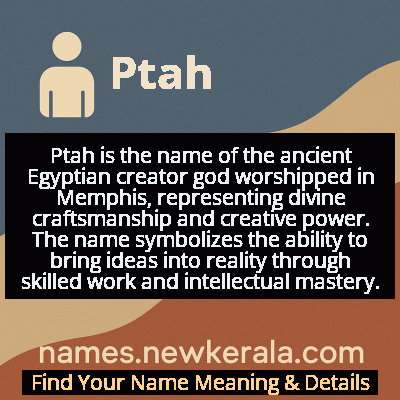Ptah Name Meaning & Details
Origin, Popularity, Numerology Analysis & Name Meaning of Ptah
Discover the origin, meaning, and cultural significance of the name PTAH. Delve into its historical roots and explore the lasting impact it has had on communities and traditions.
Name
Ptah
Gender
Male
Origin
Egyptian
Lucky Number
9
Meaning of the Name - Ptah
Ptah is the name of the ancient Egyptian creator god worshipped in Memphis, representing divine craftsmanship and creative power. The name symbolizes the ability to bring ideas into reality through skilled work and intellectual mastery.
Ptah - Complete Numerology Analysis
Your Numerology Number
Based on Pythagorean Numerology System
Ruling Planet
Mars
Positive Nature
Generous, passionate, energetic, and humanitarian.
Negative Traits
Impulsive, impatient, moody, and can be overly emotional.
Lucky Colours
Red, maroon, scarlet.
Lucky Days
Tuesday.
Lucky Stones
Red coral, garnet.
Harmony Numbers
1, 2, 3, 6.
Best Suited Professions
Military, sports, philanthropy, leadership roles.
What People Like About You
Courage, energy, leadership, generosity.
Famous People Named Ptah
Ptahhotep
Ancient Egyptian Vizier and Philosopher
Author of The Maxims of Ptahhotep, one of the oldest surviving books of wisdom literature
Ptahshepses
Ancient Egyptian High Priest
Chief of the Royal Hairdressers and High Priest of Ptah during the Fifth Dynasty
Ptahmose
Ancient Egyptian Vizier
Served as Vizier of Upper Egypt under Amenhotep III and was chief overseer of priests
Name Variations & International Equivalents
Click on blue names to explore their detailed meanings. Gray names with will be available soon.
Cultural & Historical Significance
Ptah's significance extended beyond creation mythology to practical domains - he was the divine patron of architects, sculptors, metalworkers, and all craftspeople, embodying the transformative power of skilled work. His temple in Memphis, the Hut-ka-Ptah (literally 'Mansion of the Ka of Ptah'), gave Egypt its Greek name Aigyptos. Ptah was also part of the Memphite Triad alongside his consort Sekhmet and their son Nefertem, representing a complete divine family that protected and sustained the city of Memphis and its people. Throughout Egyptian history, Ptah remained a central figure in state religion and royal ideology, with pharaohs often seeking his blessing for construction projects and claiming his creative power in their royal titulary.
Extended Personality Analysis
Individuals named Ptah are often perceived as creative, methodical, and intellectually powerful, reflecting the god's attributes as a divine craftsman and creator. They tend to be deep thinkers who approach problems systematically, possessing the patience and precision required for complex tasks. Like the deity who brought order from chaos through careful planning and execution, people with this name often exhibit strong organizational skills and a talent for turning abstract ideas into tangible reality.
There's typically an air of quiet authority about them - they lead through competence rather than loud proclamation. They value craftsmanship in all its forms and often have artistic or technical talents. While they may appear reserved initially, they possess strong convictions and the ability to manifest their visions through persistent, careful work. Their creative energy is balanced by practical wisdom, making them both dreamers and doers who understand that great achievements require both inspiration and diligent execution. They tend to be reliable, stable individuals who build lasting structures in their personal and professional lives.
Modern Usage & Popularity
In contemporary times, Ptah remains an extremely rare given name, primarily used by people with strong connections to Egyptian heritage or those deeply interested in ancient Egyptian culture and mythology. The name sees occasional use among African diaspora communities seeking to reconnect with pre-colonial African identities and spiritual traditions. It's more commonly encountered in academic, historical, or spiritual contexts rather than as a mainstream personal name. The name's usage has remained consistently low throughout modern naming records, with no significant popularity trends or spikes. It occasionally appears in creative works, spiritual communities, and among Egyptology enthusiasts, but its complex pronunciation and strong mythological associations make it challenging for everyday use in most Western societies. The name is virtually absent from modern baby name rankings and is considered a highly specialized choice.
Symbolic & Spiritual Meanings
Ptah symbolizes the power of creation through intellect, speech, and skilled craftsmanship. He represents the transformation of thought into substance, idea into reality, and chaos into order. The name carries connotations of divine artistry, architectural genius, and the sacred nature of manual and intellectual labor. Symbolically, Ptah embodies the union of creative vision with practical execution - the ability to conceive magnificent designs and then patiently, skillfully bring them into being. He represents the principle that true creation requires both inspiration and technique, both visionary thinking and meticulous craftsmanship. The name also symbolizes stability and endurance, as Ptah was associated with the djed pillar representing steadfastness and permanence. In a broader sense, Ptah represents the human capacity to shape our world through knowledge, skill, and purposeful action, serving as a reminder that we are co-creators of our reality through our thoughts, words, and deeds.

